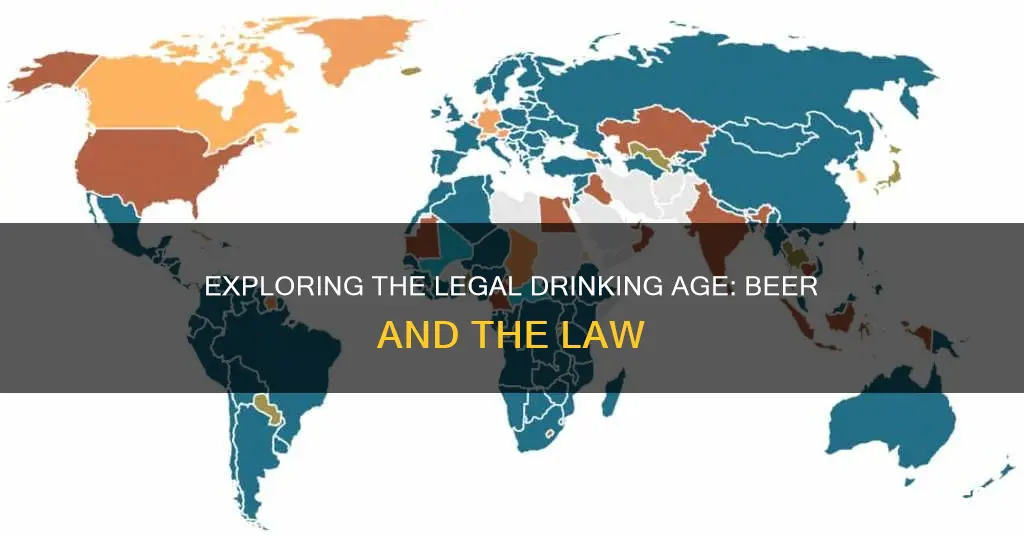
In the United States, the legal drinking age is 21. However, there are exceptions to this rule in almost every state. In 29 states, minors are allowed to possess alcohol with a family exception, and in 19 states, they are allowed to consume it. In 31 states, family members are permitted to furnish a minor with alcohol. These exceptions often specify that the minor must be in the presence of a family member, and may also include location restrictions. For example, some states only allow minors to consume alcohol at the private home of a parent or guardian, while others permit it on licensed premises. Additionally, 26 states allow minors to drink as part of religious services, and 16 states allow it for medical purposes.
| Characteristics | Values |
|---|---|
| Legal drinking age in the US | 21 |
| Year the legal drinking age was established | 1984 |
| Minimum age for serving drinks in the US | 18 |
| No. of states with exceptions to the drinking law | 45 |
| No. of states with no exceptions to the drinking law | 5 |
| No. of states that allow minors to drink for religious purposes | 26 |
| No. of states that allow minors to drink for medical purposes | 16 |
| No. of states that allow minors to drink for educational purposes | 11 |
| No. of states that allow minors to drink for law enforcement purposes | 4 |
| No. of states that allow minors to drink in the presence of a family member | 31 |
What You'll Learn

Drinking at home with family
In the UK, it is illegal for anyone under the age of 18 to buy alcohol. However, in England, Scotland and Wales, it is legal for children between the ages of five and 17 to drink alcohol at home or on other private premises, as long as they are supervised by a legal guardian. Despite this, the NHS advises that children under 15 should not consume alcohol at all, due to the associated risks to their health and wellbeing. These risks include the negative impact on the development of vital organs, as well as an increased likelihood of engaging in risky behaviours, such as violence and drunk driving.
In the US, the minimum legal drinking age is 21. However, the laws vary across different states, with at least 37 states allowing exceptions for underage drinking at home with family members. These laws are often confusing and contradictory, making it difficult for parents, teens, and even legal professionals to understand what is permitted.
Regardless of the legal drinking age, it is important for parents to talk to their children about alcohol and ensure they understand the risks. It is also crucial to set a good example by drinking in moderation and not engaging in risky behaviours. If you are concerned about a child's drinking, it is important to seek help from a doctor or support services.
Beer Festivals: A Guide to the Frothy Fun
You may want to see also

Drinking with parental consent
In the United States, the legal drinking age is 21 years old. However, there are exceptions to this rule that vary by state. In 29 states, it is permissible for someone under 21 to drink alcohol with their parent's permission, as long as it occurs in a private residence or on private property. Additionally, eight states allow underage drinking with parental consent in public restaurants or bars.
It is important to note that even in states where underage drinking with parental consent is allowed, there are still restrictions and legal consequences to be aware of. For example, in some states, the parent must be visibly present when the minor consumes or possesses the alcoholic beverage. Furthermore, the law typically only applies to the parent's own child and does not extend to serving alcohol to their child's friends.
The rationale behind allowing underage drinking with parental consent is often based on the belief that it is safer for teens to drink at home under the supervision of their parents. This way, parents can monitor their child's alcohol consumption and ensure they drink responsibly. However, it is crucial for parents to be aware of the potential risks associated with underage drinking, including negative effects on brain development and mental health.
In summary, while some states do permit drinking with parental consent for those under 21, it is important to be aware of the specific laws and restrictions in your state, as well as the potential risks associated with underage alcohol consumption.
Beer Butt Chicken: Does It Work?
You may want to see also

Drinking for religious purposes
Drinking laws vary across the world, and in some places, exceptions are made for drinking for religious purposes.
In the United States, the minimum legal drinking age is 21. However, there are exceptions in several states that allow underage drinking for religious purposes. According to the National Institute on Alcohol Abuse and Alcoholism, 26 states permit minors to drink as part of religious services.
The relationship between religion and alcohol is complex and varies across different faiths. While some religions strictly prohibit alcohol consumption, others incorporate it into their rituals and ceremonies.
For example, in Christianity, red wine is used as a spiritual symbol for the blood of Christ during holy communion. In the Eastern Orthodox faith, vodka is blessed by priests and consumed during religious celebrations like Easter, or poured onto graves as an offering to the deceased.
In Judaism, wine holds an essential place in various religious rituals and celebrations. It is used during the Sabbath and festival meals as part of the Kiddush blessing, and plays a central role in the Passover Seder, where participants drink four cups of wine to symbolize redemption.
Buddhists typically abstain from alcohol, as it is believed to cloud the consciousness and hinder the path to enlightenment. However, some Buddhists practice "mindful drinking," viewing alcohol as a tool to relax the ego and enhance focus on their intentions.
Hinduism does not have a central authority, but religious texts generally discourage alcohol consumption. However, some Hindu sects, such as Tantric groups, use alcohol in sacred ways, offering it to deities or as medicine for ritual healing.
In Shinto, sake is revered as the "liquor of the gods." It is offered to deities at shrines and used in agricultural rites, such as the jichinsai ground purification ritual, where it is poured liberally onto construction sites.
In summary, while the legal drinking age in many places is 18 or 21, exceptions are often made for drinking for religious purposes. The role of alcohol in religious contexts varies across faiths, with some incorporating it into rituals and others forbidding it altogether.
Morning Beer: Should You Drink Before Work?
You may want to see also

Drinking for medical reasons
Drinking laws vary from state to state in the US, and while drinking is illegal for anyone under the age of 21, there are exceptions in most states that allow for underage drinking in certain circumstances. One of these exceptions is for medical purposes.
According to the non-profit non-partisan site ProCon.org, 16 states allow minors to consume alcohol for "medical" purposes. However, these provisions are likely intended to protect the use of alcohol-containing medicines like cough syrup.
In addition to medical purposes, there are several other exceptions to the minimum drinking age law. At least 37 states have some sort of exception that allows underage people to drink at home in the company of family members. For example, in New York, it is illegal for those under 21 to possess alcohol with the intent to consume, but there is an exception for drinking with parents. Specifically, "a person under the age of 21 years may possess any alcoholic beverage with the intent to consume if the alcoholic beverage is given to the person under 21 years of age by that person's parent or guardian."
Other exceptions to the minimum drinking age include religious services (26 states), educational purposes for students in culinary school (11 states), and government research or police work (4 states).
The patchwork of state laws governing exceptions to statutes on underage alcohol possession can be confusing, not only for regular people but also for legal professionals.
Understanding Beer Columns: Brewing Process Simplified
You may want to see also

Drinking in bars/restaurants with a parent
The legal drinking age in the United States is 21. However, there are exceptions to this rule in certain states. Eight states allow people under 21 to drink with parental consent in public restaurants or bars. These states include Wisconsin, Oregon, and New York. In Wisconsin, people can drink in a bar with a parent buying the drinks for them as young as 14. In Oregon, underage drinking is permitted if the alcohol is provided by a guardian or spouse.
Despite these exceptions, many bars and restaurants may still refuse to serve alcohol to minors, even if they are accompanied by a parent or guardian. This is because establishments may not be aware of the specific laws, or they may not want to take the risk of losing their alcohol license.
In addition to the eight states with parental consent laws for public drinking, many other states have laws permitting underage drinking in private residences with parental consent. In 29 states, someone under 21 may drink with their parent's permission if it is in a private residence or on private property. Six states allow someone under 21 to drink on private property without their parent's consent.
Other exceptions to the national drinking age law include religious ceremonies, medical purposes, educational purposes, and government work.
Chilling Beer Fast: How Do Chiller Sticks Work?
You may want to see also
Frequently asked questions
The legal drinking age in the US is 21. This was established by the National Minimum Drinking Age Act in 1984.
No. It is illegal for anyone under 18 to buy alcohol, and for over 18s to buy beer for 16 and 17-year-olds.
Yes, there are some exceptions. These include religious activities, educational purposes, lawful employment, parental consent, law enforcement purposes, and medical reasons.







